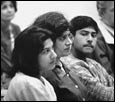Ambitious Efforts to Court Class of 2003
Campus Pulls Out All the Stops in Campaign to Recruit Underrepresented Minority Students
By Janet Gilmore, Public Affairs
Posted March 31, 1999
 Admitted students and their parents at a Cal Day recruitment event. Peg Skorpinski photo. |
The effort began early this month with groups of students and staff phoning applicants to encourage them to choose Berkeley. The campus also plans to both phone and make face-to-face contact with every African American, Latino, Filipino and American Indian student offered admission.
Berkeley is also offering these students information on expanded financial aid opportunities. And all applicants admitted for fall 1999 will be invited to a series of small, informal gatherings to be held throughout the state.
"We want to make sure that there is no question in the minds of these students that we want them here at Berkeley -- because we do," said Chancellor Berdahl. "Our goal is that, through this extraordinary level of personal contact, they will see that for themselves."
Campus officials began expanding their efforts last year to recruit admitted underrepresented minority students, using letters, videotapes and personal phone calls. Such efforts are underway again.
But this year's push to attract underrepresented minorities is much broader. It started much earlier. And it involves more opportunities for financial support.
Instead of waiting to find out which students would be admitted, representatives with the Berkeley Cares program -- an effort by the campus's financial aid office to assist prospective students -- immediately began targeting a select group of underrepresented minority applicants. Between Feb. 8 and March 2, students and staff began making phone calls to these 1,357 middle- and low-income applicants, offering assistance with the financial aid application process. The deadline to turn in financial aid information was March 2.
Amber Chitty, a Berkeley senior who placed more than 100 calls herself, said some students are unaware of the financial aid deadlines. She added that many students or parents who did not need help with financial aid used the call as an opportunity to ask questions about student life at Berkeley.
"It's great that they have us students calling because we remember what it was like," said Chitty. "I tell everybody the most important thing is to visit the campus. Once you come and experience it, everything just clicks."
An African American from Covina in Southern California, Chitty tells prospective students how she once weighed offers from Berkeley, Harvard and West Point. It was her visit to campus that convinced her that this is where she would feel most comfortable.
Underrepresented minority students and low-income students have access to a variety of financial aid opportunities, including the Berkeley-based Incentive Awards, Singer Family Foundation, Partnership Opportunity and Achievement Award scholarship programs.
Admissions letters were mailed to students March 31. Soon after receiving their letters, students will receive more phone calls and more letters inviting them to various events.
The goal is to ensure that each student meets personally with someone from Berkeley -- whether he or she attends a small reception in someone's home or comes to campus for Cal Day.
Set for Saturday, April 17, this year's Cal Day campus open house will offer special events and information about educational and research activities at Berkeley. It will also feature workshops, campus tours and organized lunches and dinners held by the Black Recruitment and Retention Center, RAZA Recruitment and Retention Center, Native American Recruitment and Retention Center and Filipino Academic Services.
Special efforts also are underway to reach targeted groups of underrepresented minority students, such as those who will likely major in mathematics, science or engineering -- areas in which minority students are underrepresented in colleges and universities across the country.
Berkeley's Coalition for Excellence and Diversity in Mathematics, Science and Engineering aims not only to tell underrepresented minority students what Berkeley has to offer, but to help them discover which college or university might best meet their needs, given their particular interests and goals.
"We're not just interested in increasing our numbers, " said John Matsui, director of campus's Biology Scholars Program and a member of the coalition. "We want to provide a service to these students. We want them to find the best fit."
![]()
![]()
March 31 - April 6, 1999 (Volume 27, Number 28)
Copyright 1999, The Regents of the University of California.
Produced and maintained by the Office of Public Affairs at UC Berkeley.
Comments? E-mail berkeleyan@pa.urel.berkeley.edu.